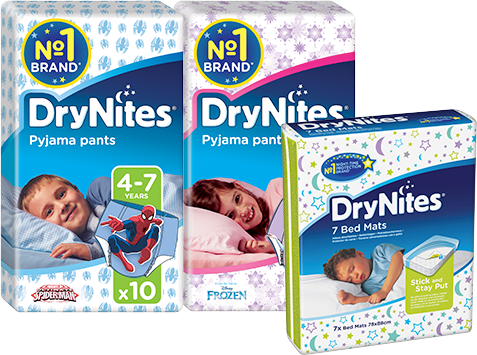Bedwetting Myths
A lot of supposed ‘truths’ about bedwetting are in fact completely false. Here’s some of the most commonly heard bedwetting myths:
MYTH: Bedwetting is a behavioural problem
TRUTH: Children who wet the bed do not do so on purpose. While there are a number of causes, a behavioural issue is not one of them. It’s important to remember that this is a perfectly normal development stage, one that most children will grow out of naturally.
MYTH: Someone's to blame
TRUTH: Bedwetting is no one's fault; it’s something that a child has no control over. There are many reasons why it happens, but very few can be influenced by either parent or child.
MYTH: Wearing DryNites® delays the end of bedwetting
TRUTH: There is no evidence to suggest that using absorbent sleepwear delays or hinders progress. DryNites® won't cure your child's bedwetting, but they will help you both manage the phase with discretion and confidence.
MYTH: It's a serious condition
TRUTH: Bedwetting is a common occurrence - almost 10% of all 4–15 year-olds wet the bed at some point. There are lots of reasons why it might happen, most of which are nothing to worry about.
MYTH: You mustn’t let your child drink after 4pm
TRUTH: This could in fact make the situation worse, as limiting drinks may cause dehydration. It also reduces the amount the bladder can hold (before getting the sensation of fullness). Make sure your child has plenty to drink throughout the day and goes to the toilet regularly - to develop good bladder habits.
MYTH: Carrying your child to the toilet at night will stop them from bedwetting
TRUTH: Most parents try ‘lifting’ at some point, as taking them to the toilet seems like an obvious way to stop, or at least control, the bedwetting. What it actually does is reinforce to the child that they can urinate while they are asleep. This can make the wetting worse as the child is weeing without responding to their brain waking them because of a full bladder.
MYTH: There is an instant cure for bedwetting
TRUTH: Nothing will instantly cure bedwetting. However, using absorbent sleepwear like DryNites® and providing encouragement helps you manage the situation and boost your child’s confidence. If you have medical concerns, you should seek advice from your GP, health visitor or school nurse as there are NHS bedwetting clinics which can assess the situation. In any case, it’s important to recognise the wishes and emotional wellbeing of the child. Showing sensitivity and giving reassurance will help them to feel supported.


